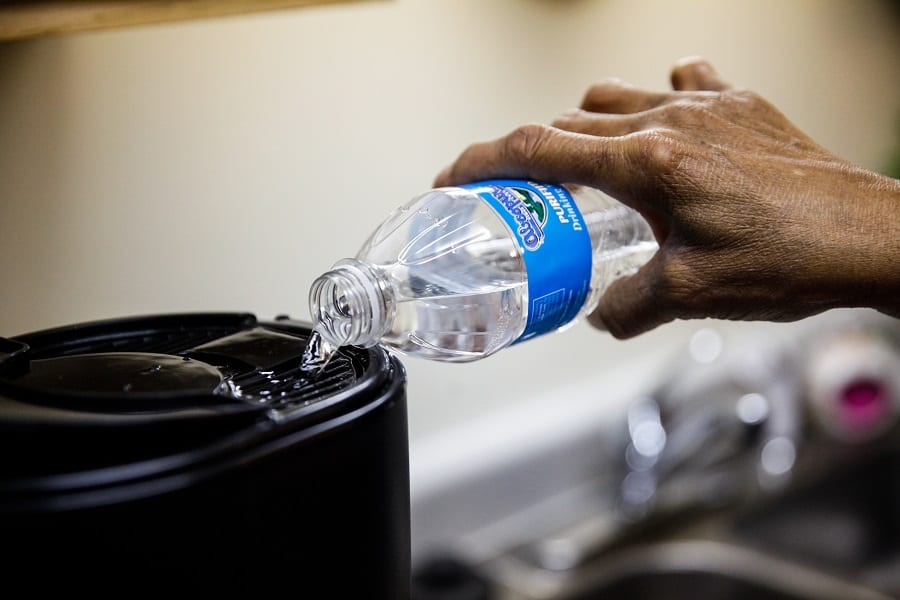Coffee is a way of life for many people.
It helps us feel normal on a Monday morning and turns our frown upside down.
And thanks to the convenience of coffee makers and machines, all it takes is the click of a button to enjoy a fresh home-brewed cup of coffee.
If you’ve recently purchased a new coffee maker, you’re probably wondering what is the best kind of water to use when making coffee.
You may be considering filtered water, tap water, or even distilled water.
Distilled water is water that has been boiled to remove impurities and often the beneficial minerals as well.
Therefore it’s not a great choice for coffee as the lack of minerals can enhance the flavor making the coffee bitter.
In addition to this, it can also speed up the corrosion on the inner parts of the coffee maker.
Contents
What exactly is distilled water?
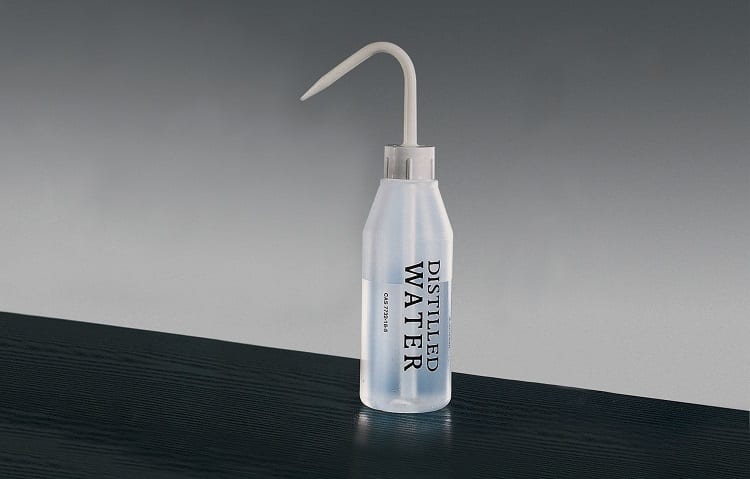
Distilled water is safe for drinking, however, you may not like the taste because it is flatter and has less flavor than tap or bottled water.
Distilled water is created by boiling it and then condensing the collected steam back into water form. Ultimately, this process removes impurities and minerals from the water.
Some people believe that drinking distilled water will help detoxify your body and improve your health, while others claim that distilled water leaches minerals from your body and could put your health at risk.
Unlike tap water, when you drink distilled water you don’t get the minerals like Calcium and magnesium out of it.
Since distilled water does not contain its own minerals, it pulls them from whatever it touches to maintain a balance.
So when you consume distilled water, it may pull small amounts of minerals from your body, such as your teeth.
Most of the minerals we have is derived from our diet, therefore, drinking distilled water should not make you mineral deficient.
Pros
Depending on where you live, distilled water can often be of far better quality than tap water. In fact, thinking distilled water is safer for you if your area’s tap water includes harmful chemicals or pesticides.
Cons
Storing distilled water tends to be a problem. This is because it draws minerals from any material that it touches. Therefore, it can pull trace amounts of plastic or whatever substance is in the container that’s holding it.
Why shouldn’t you use it for coffee making?
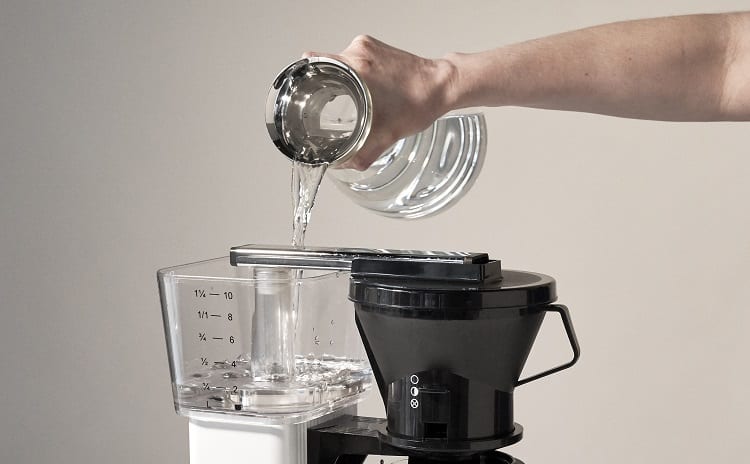
If you are still considering using distilled water in your coffee maker, it’s really not a good idea, and here are some reasons why.
Distilled water is believed to prevent mineral build-up inside coffeemakers and this is why some people believe they should be using it.
However, it can also reduce the lifespan of your coffee machine.
Distilled water speeds up corrosion of heating elements such as the boiler walls, rubber washers, and other vital components.
In addition to that, it doesn’t taste very good. The distillation process removes all of the minerals that usually make water taste good.
So when using distilled water to make coffee, your coffee will taste rather bitter.
It’s often said that you should use water that you like to drink to make coffee since your coffee is 98% water.
Therefore, if distilled water does not taste good on its own, it’s definitely not going to taste good in your coffee.
Another option is to use softened water which encapsulates the minerals maintaining the structure within the water while preventing the ability to adhere to internal components.
So in other words, bottled water is recommended over distilled water and you can also use good old-fashioned tap water.
Dangers of distilled water
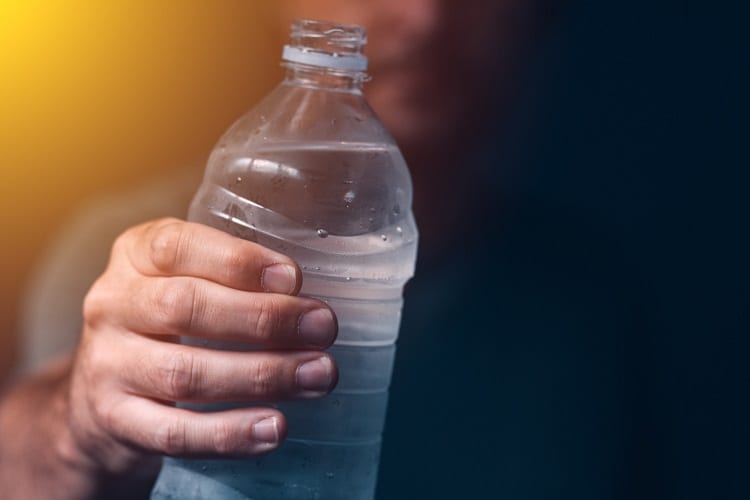
One of the major downsides of drinking distilled water is that it lacks minerals.
So if you are consuming it, be sure to get minerals from fruits, vegetables, and other nutritious food.
Distilled water is a variety of drinking water that’s been ultra-purified. It may sound like a positive thing and in some cases, it is, however, it can also be detrimental to your health.
The purification process removes contaminants and this is advantageous, however, it’s not so healthy when it removes minerals as well.
Minerals are needed for a range of body functions and distilled water isn’t an ideal replacement for other kinds of drinking water.
The lack of naturally occurring minerals such as potassium, chloride, and sodium in distilled water can pose a negative health risk when fasting or restricting calories.
These minerals are known as electrolytes.
And when it’s not contained in our primary hydration source or diet, it results in severe dehydration and chemical imbalances which ultimately lead to more complicated health issues.
Distilled water also has a tendency to increase the body’s acidity.
Distilled water triggers the stomach to produce more acids through chemical processes and this can cause gastrointestinal discomfort.
When it comes to distilled water and other types of water such as purified water, there is one fundamental difference.
While distilled water removes the contaminants and minerals, purified water only removes the contaminants and retains the minerals.
So in this case, purified water would be much healthier for you to consume as opposed to distilled water.
So what type of water is actually safe to drink?
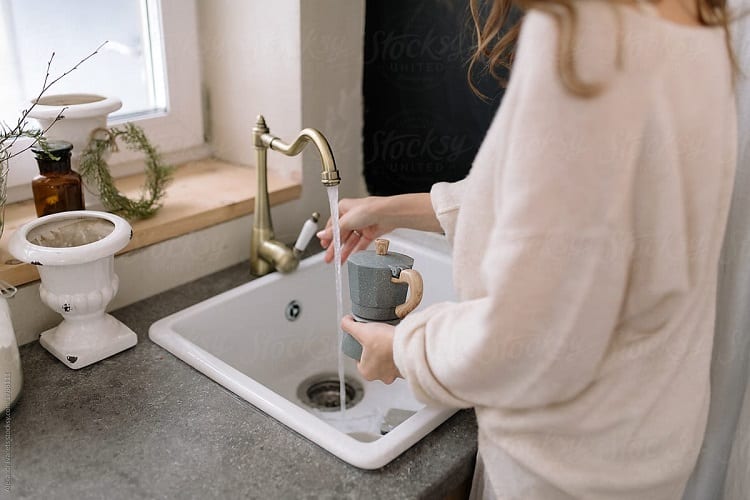
Tap water is regulated by the Environmental Protection Agency and bottled water is regulated by the FDA.
Therefore, these two types of water are safe to consume because they do not contain contaminants.
People who have a weakened immune system are at risk of becoming sick from drinking contaminated water.
According to Harvard University, bottled water isn’t all that much different or safer than tap water.
However, it is considerably more expensive than tap water.
Furthermore, when you consume bottled water, you should note that millions of barrels of oil are used to manufacture plastic water bottles in the US alone, therefore, contributing to pollution and global warming.
What to do if your water is not drinkable?
Have you ever wondered how you can tell if you drinking water is safe or not?
Well, here are a few ways to determine whether or not you should be consuming water from your tap.
Check for cloudiness
Water that is safe for drinking should be clear and should not contain any odor or unusual taste.
One way to tell if the water is contaminated is to look for signs of cloudiness. Cloudy water may not necessarily be a health risk, however, it could signal the presence of unsafe pathogens or chemicals.
Check if your hands are slimy after washing
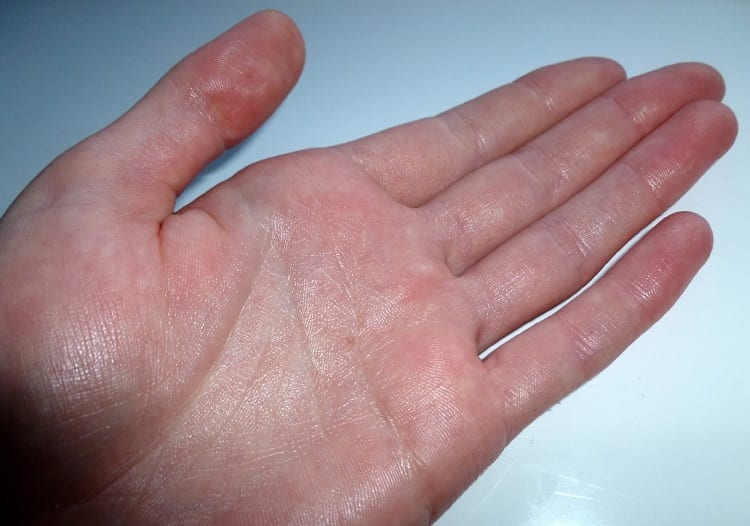
Hard water is often characterized by a buildup of substances such as calcium and magnesium which often leaves deposits on your sink, faucet, or in your drinking glass.
This is also why your hands feel slimy after washing with soap and water or you have to use more laundry detergent to get your clothes clean.
Although this isn’t a sure-fire way of knowing that your water is contaminated, in some cases, it could just be excess calcium and magnesium and this should not pose any harm.
On the other hand, it could be an indicator of metals like manganese, aluminum, and lead.
One of the best ways to ensure that your drinking water is safe from contaminants and purified is to boil and allow it to cool before drinking.
Conclusion
Coffee has a wealth of health benefits for the body and mind such as helping you lose weight, enhancing physical performance, decreasing your risk of certain diseases, and helping you stay focused and alert.
By investing in a coffee maker, you’ll just be making it easier to get your hands on these health benefits.
However, it’s also equally important to ensure that you are using the right type of water in your coffee maker so that you get the best possible value for your money and prolong the life of your coffee machine.

